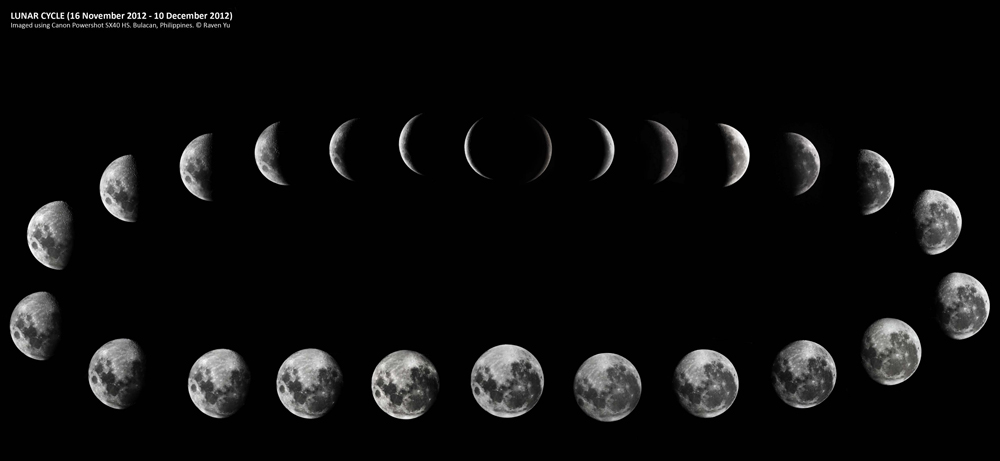What Shari’ah Says
According to Shari’ah, to establish the beginning of the new lunar month, the crescent must be sighted by the naked eye under specific conditions. The sighting may, however, be influenced by a number of factors including:
the life-length of the crescent, and the angle it forms with the sun;
the height of the crescent relative to the horizon line at the time of sunset;
the distance between the earth and the moon;
weather conditions and the degree of visibility.
The first two factors are essential. The third is only partially important. That’s because the distance between the earth and the moon changes by approximately ± 4% only. This small rate has a negligible effect on visibility.
The fourth factor depends on variable local conditions at the time of sighting the crescent.
In 1978, the Islamic jurisprudence committee of the Islamic Conference (OIC) set the following conditions for the crescent sighting:
- The angle of the crescent’s position above the horizon at sunset must be at least 5 arc degrees;
- The angle formed by the moon and the sun must be at least 8 arc degrees.
When these two most essential conditions are there, the following day shall be the first day of the new month.
The motion of the moon can now be calculated with great precision, but the beginning of every new lunar month remains a problem.
Surveys will have to be conducted in various places in the Islamic world for several years for sufficient statistical analysis. If this is done, differences between Muslim countries in marking religious occasions may be finally overcome.
Prophetic Advice
Whenever faced with two or more options, Prophet Muhammad (SAW) always chose the easier. The Qur’an (Surat At-Tawbah 9:128) describes him as being extremely commiserating and willing to spare the Muslims suffering and hardship.
Surat Al-Baqarah 2:185 also tells us that God intends every facility for the faithful. He doesn’t will putting them to unaffordable tasks in life.
Shari’ah was therefore satisfied with what was within the means of the Prophet’s companions. This, however, doesn’t mean that new scientific methods are to be excluded. This seemingly contradiction of views calls for a closer look.
Early Muslim scholars were almost unanimous in rejecting astronomical methods during their time. To them, there was no clear line of demarcation between astronomy and astrology.
However, modern astronomy is different. It draws on spherical geometry and celestial mechanics. These two modern branches of science enabled man to land on the moon over a quarter of a century ago.
Nowadays
According to Dr. Mostafa Al-Zarqa, a leading Muslim scholar, the debate on the legitimacy of astronomical calculation is the greatest oddity in modern jurisprudence, remaining hot at a time when man has navigated the vast expanses of the universe, and landed on the moon.

At the present time, landing on the moon is no longer a great feat. All relevant Hadith suggest that sighting the moon with the naked eye was the only method available back then because the majority of the Muslim population was illiterate.
This by no means excluded verifiable scientific methods that are capable of yielding extremely accurate results. The naked-eye method is perfectly acceptable when conditions of clear visibility are available.
Otherwise, there is no reason behind not relying on scientific calculations. It’s a shame that there is sometimes a three-day discrepancy between Muslim countries in deciding Ramadan dates.
Futuristic Approach
The position of early Muslim jurisprudents to reject guessing and intuition as sources of reliable knowledge on this particular issue is understandable. Astronomy was still controversial at that early stage of Islam, Al-Zarqa explains.
Decades ago, the Fatwa House in Egypt decided that the naked-eye sighting is the standard method of observing the lunar months.
According to the Fatwa House, we can use astronomical measurements only as a supportive tool. Not as an alternative. But, we must reject sighting reports that contradict accurate measurements. That’s because Islam exhorts its followers to resort to the proper channels of learning and knowledge.
Meanwhile, with the approach of every new Ramadan, the same controversy around deciding its dates renews. Muslim countries observe Ramadan and other important religious occasions on different days because of a lack of standardization.
This article is from our archive, originally published on an earlier date, and now republished for its importance.
Pages: 1 2